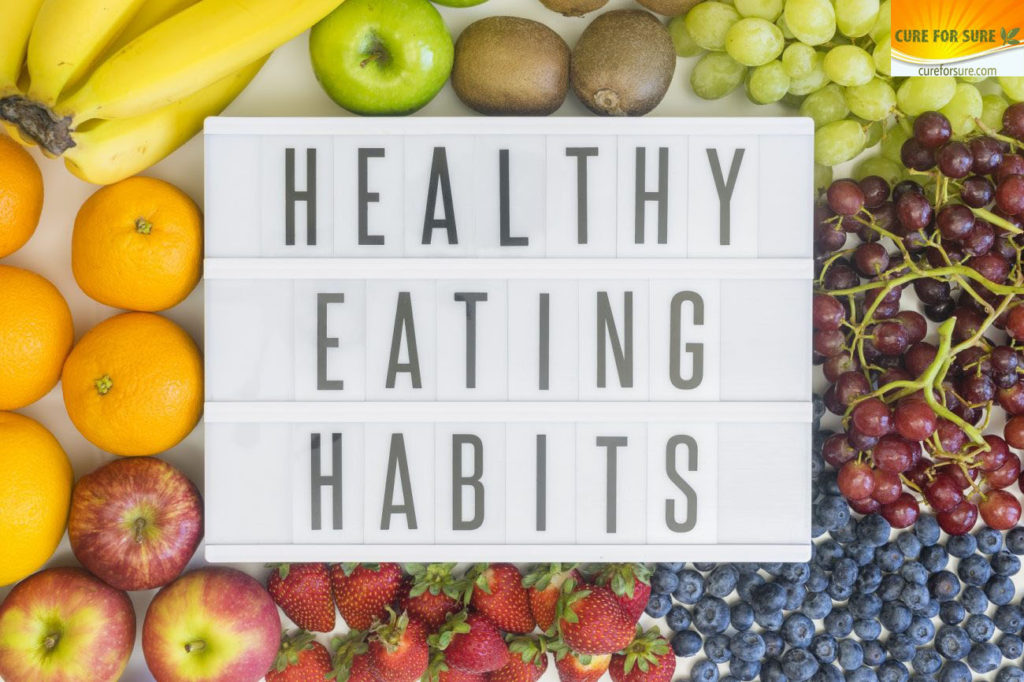
The first step towards maintaining your well-being is a healthy lifestyle and adapting nourishing dietary habits. The food you eat can influence your health and risk for developing certain diseases. To stay healthy and eat nutritious food, current urban lifestyle needs some modifications. One helpful thing is that you do not have to change all your habits at once. Small steps towards change have been reported to lead to remarkable success in making long-term changes. Therefore, it is advisable to set small goals towards adapting nourishing habits. These minor changes can eventually make a significant difference in your health. According to Ayurveda, we can add life to our years and years to our lives by adopting a healthy dietary routine.
How can you change your eating habits?
- Adapt three meals a day

Breakfast sets the tone for the day. A hearty and healthy breakfast can give your body, the momentum it needs to survive and stay energetic till lunch. Similarly, eating three regular meals each day at a consistent time and having lunch as the primary meal of the day is the best way to maintain a healthy body. Once you have assigned time for your meals, do not skip, or delay any meal, and ensure to schedule snacks, if you feel hungry. On ignoring feelings of hunger, it has been observed that you may either end up binge eating or choosing an unhealthy snack.
Ayurveda suggests that only after digestion of the preceding meal, one should consume a further meal. For example, digestion capacity is low during the night, and thus, it is not recommended to eat the following morning if you have not digested the previous day’s dinner. However, as digestion capability is high during the day, it is okay to eat an evening meal on schedule time even if you have undigested afternoon lunch.
- Follow a dietary routine

As per Ayurveda, it is recommended to start your meal with sweet taste as it helps to overcome the emptiness (Vata) of the stomach in a starving person. Following, sour and salty tastes are advised as they help to stimulate the digestive fire (agni). While pungent, bitter, and astringent taste should be consumed during the final stages of the meal as it pacifies stickiness (Kapha).
Furthermore, Indian traditional medicine recommends you should never feel heavy/bloated after eating any food. Thus, it is advised to keep one-fourth part of the stomach empty. Ayurvedic literature has provided consuming ratios regarding solid to liquid foods and food to empty part of the stomach.
It has also been suggested to eat a family meal every day in the kitchen or on the dining table. This helps you focus on eating healthy meals. While having a meal, you should relax and enjoy the food, and avoid eating too fast. As we have always been suggested by elders, one should stay away from electronic gadgets while having food. Ayurveda suggests making healthy eating a pleasure, and not a chore. You should always listen to your feelings of hunger and develop the understanding between physical hunger and habitual eating or stress/boredom-related hunger.
Ayurveda recommends eating foods within 48 minutes of cooking them. Dinner has been recommended being consumed within 90 minutes of sunset. The phase of the day has been observed to provide our system enough time to assimilate the food in harmony. As our body is ready for rest and not prepared for the heavy work of digestion, having late-night meals are not suggested. One should eat a light, well-cooked meal at least three hours before bed, and be on the bed around 10:00 p.m. or before.
Additionally, one should wait until you have swallowed your mouthful of food before consuming another portion. Once the consumed food reaches your stomach, it signals your brain about hunger satisfaction. Thus, eating swiftly before one portion is chewed and reaches the stomach, leads to overeating. If you feel stuffed/bloated in about 20 minutes after you stop eating indicates that you might be eating too quickly.
- Suitable dietary make-Up

As per Ayurveda, foods support three qualities of mind, namely, sattva, rajas, and tamas. Sattvic food indicates pure essence. It nourishes the body and maintains a peaceful state. It is the best diet for maintaining physical strength, nourishing mind, good health, and longevity. Sattvic foods include fresh fruits, legumes, nuts, sprouted seeds, honey, and herbal teas. Previous day’s left-over food is less sattvic than fresh food, and are best avoided, when convenient to do so. Rajasic food aggravates pitta and Vata in your body and also increases anger and restlessness. It includes excessive spicy, salty, and sour food such as pickles, coffee, tea, and alcohol. The tamasic diet increases the inner darkness and confusion. These include fried and frozen food, fast-food, and overnight left-over food. Such diet slows down your body systems and depresses mental activity. It is considered as one of the unhealthy foods as per Ayurveda. Eat fresh, local food while avoiding excess consumption of raw veggies or heavy meats that are difficult to digest.
Additionally, our body needs vitamin C for continued health, and it is neither produced nor stored by our body. Therefore, fresh fruits like apple, orange, banana, and other such Vitamin C-rich fruits should be included in your daily routine, especially half an hour before your evening meal.
- Drink ample water

It is highly recommended to drink sufficient warm water throughout the day as it helps to rehydrate our system and flush toxins out of the body. When the body is not hydrated enough, it cannot remove impurities and accumulates toxin in the body. Additionally, water is remarkably beneficial, instead of high-sugar drinks. It is also suggested to avoid drinking ice-cold water, especially before, during, and after meals as it can lead to indigestion/bloating /gaining weight. Only if you have been diagnosed with excessive heat (pitta), you should drink cold water; otherwise, room-temperature or warm water is best for a healthy and sound body.





















 Amla, also known as Amalaki, has a sour taste as its name suggests.
Amla, also known as Amalaki, has a sour taste as its name suggests. 

 You might be surprised to know that there were 422 million cases of diabetes in 2014, compared to 108 million in 1980, a 314 million increase in just 34 years. Before learning about the diet, you should first understand what
You might be surprised to know that there were 422 million cases of diabetes in 2014, compared to 108 million in 1980, a 314 million increase in just 34 years. Before learning about the diet, you should first understand what  According to Ayurveda, the
According to Ayurveda, the  Acharya Charaka says that the properties of alcohol are the same as venom.
Acharya Charaka says that the properties of alcohol are the same as venom.  Consuming pure form of milk –
Consuming pure form of milk –






